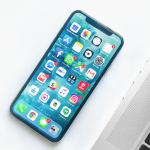Here in the UK, we are currently starting to move beyond the initial shock of shifting to remote work, so the next collective reaction seems to be a strong sense of digital overload. When in the past I used to be that annoying vocal social media friend, now all our friends and colleagues are active online! It’s natural to feel tired and stressed out, of course. It is also extremely important to start managing our digital activities pro-actively. Today I would like to look at how to manage our mobile notifications because it is the device most attached to us during the day. Below are my personal tips, but I would love to know what works for you:
- Curate your front screen very carefully – it took me a while to understand that my home screen does affect how I feel so today I use it for quick access to the most important apps with their notifications (my social media folder or work-related apps), but also for mindfulness, entertainments and learning. Having a good balance on the home screen, makes me feel balanced too. My home screen notifications are an invitation to work, but also to relax.
- Keep busy but intrusive apps on your second screen – it also took me a while to understand that notifications do affect me. As a social media consultant, I am receiving a lot of notifications on internal networks (Workplace) and social media channels (especially on apps that don’t allow mass “read all” function for notifications – for example, the Facebook pages manager). Because I cannot control the volume of the notifications on those apps, I move them to my second screen which means that they do not stress me out and I can still access them fairly fast, if I need to.
- Group apps into folders for easy access – I used to have to flip between multiple screens, but I personally find app folders and various device shortcuts really useful now.
- Switch off unnecessary notifications – each app has its own settings for notifications and we are usually not making the most of those settings. It can sound like a lot of work at first, but it really pays off to set up notifications according to what we need to see and what is irrelevant, and thus disruptive.
- Delete apps you don’t use – as our lives change, our app usage changes too so it’s important to review our list of apps and delete the unnecessary ones.
- Keep apps you use to relax, learn, stay informed and play – if we use our mobile phones for work, we might forget that modern devices are quite powerful. Why not include a cooking app, an online course, a stargazing app or a game too? If we use our phone for learning, growth, play and entertainment we will feel more positive about the mobile device too.
- Keep your apps updated – I am adding this to the list not just because of the security of all apps, but mainly because the outdated apps tend to crash. We might also miss the updates on apps that allow for a wider range of controls and choices around their notifications.
This is what works for me and helps me avoid the feeling of digital overload. I would love to know what works for you?
Photo by Rahul Chakraborty on Unsplash

